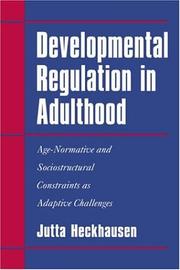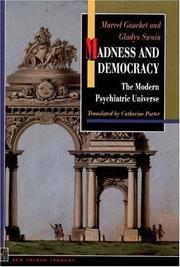| Listing 1 - 2 of 2 |
Sort by
|

ISBN: 0521581443 0521027136 0511527853 0511823177 Year: 1999 Publisher: Cambridge : Cambridge University Press,
Abstract | Keywords | Export | Availability | Bookmark
 Loading...
Loading...Choose an application
- Reference Manager
- EndNote
- RefWorks (Direct export to RefWorks)
Human behavior is very flexible and ontogenetic potential adds to the scope of variability of developmental paths. Therefore, development in the life course needs to be regulated. Developmental regulation by the individual is scaffolded by external constraints. External constraints to development based on biological aging, institutional age-grading, and internalized age norms provide an age-graded agenda for striving for developmental growth and avoiding developmental decline. The life-span theory of control proposes that control of one's environment is the key to adaptive functioning throughout the life span. The theory identifies the evolutionary roots and the life-span developmental course of man striving to control the environment (primary control) and the self (secondary control). Primary control is directed at producing effects in the external world, while secondary control influences the internal world so as to optimize the motivational resources for primary control. In this 1999 book, a series of studies illustrate the rich repertoire of the human control system to master developmental challenges in various age periods and developmental ecologies.
Control (Psychology) --- Developmental psychology --- Self-control --- #PBIB:1999.4 --- Self-discipline --- Self-mastery --- Discipline --- Development (Psychology) --- Developmental psychobiology --- Psychology --- Life cycle, Human --- Power (Psychology) --- Emotions --- Senses and sensation --- Health Sciences --- Psychiatry & Psychology --- Developmental psychology. --- Self-control.

ISBN: 1283539888 9786613852335 1400822874 1400811708 9781400811700 9781400822874 0691033722 9780691033723 140080261X 1400802628 9781400802616 9781283539883 Year: 1999 Publisher: Princeton, N.J. : Princeton University Press,
Abstract | Keywords | Export | Availability | Bookmark
 Loading...
Loading...Choose an application
- Reference Manager
- EndNote
- RefWorks (Direct export to RefWorks)
How the insane asylum became a laboratory of democracy is revealed in this provocative look at the treatment of the mentally ill in nineteenth-century France. Political thinkers reasoned that if government was to rest in the hands of individuals, then measures should be taken to understand the deepest reaches of the self, including the state of madness. Marcel Gauchet and Gladys Swain maintain that the asylum originally embodied the revolutionary hope of curing all the insane by saving the glimmer of sanity left in them. Their analysis of why this utopian vision failed ultimately constitutes both a powerful argument for liberalism and a direct challenge to Michel Foucault's indictment of liberal institutions.The creation of an artificial environment was meant to encourage the mentally ill to live as social beings, in conditions that resembled as much as possible those prevailing in real life. The asylum was therefore the first instance of a modern utopian community in which a scientifically designed environment was supposed to achieve complete control over the minds of a whole category of human beings. Gauchet and Swain argue that the social domination of the inner self, far from being the hidden truth of emancipation, represented the failure of its overly optimistic beginnings.Madness and Democracy combines rich details of nineteenth-century asylum life with reflections on the crucial role of subjectivity and difference within modernism. Its final achievement is to show that the lessons learned from the failure of the asylum led to the rise of psychoanalysis, an endeavor focused on individual care and on the cooperation between psychiatrist and patient. By linking the rise of liberalism to a chapter in the history of psychiatry, Gauchet and Swain offer a fascinating reassessment of political modernity.
Psychotherapy --- Power (Psychology) --- Hospitals, Psychiatric. --- Mental Disorders --- Mental illness --- Power (Social sciences) --- Psychiatric hospital care. --- Emotions --- Psychology --- Senses and sensation --- Psychagogy --- Therapy (Psychotherapy) --- Clinical sociology --- Mental health counseling --- Empowerment (Social sciences) --- Political power --- Exchange theory (Sociology) --- Political science --- Social sciences --- Sociology --- Consensus (Social sciences) --- Mentally ill --- Psychiatric hospital treatment --- Hospital care --- Mental health services --- methods. --- therapy. --- Social aspects. --- Treatment --- Control (Psychology) --- Treatment. --- Methodology.
| Listing 1 - 2 of 2 |
Sort by
|

 Search
Search Feedback
Feedback About UniCat
About UniCat  Help
Help News
News